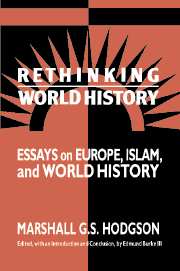Book contents
- Frontmatter
- Contents
- Editor's preface
- Introduction: Marshall G. S. Hodgson and world history
- Part I Europe in a global context
- 1 The interrelations of societies in history
- 2 In the center of the map: Nations see themselves as the hub of history
- 3 World history and a world outlook
- 4 The great Western Transmutation
- 5 Historical method in civilizational studies
- 6 On doing world history
- Part II Islam in a global context
- Part III The discipline of world history
- Conclusion: Islamic history as world history: Marshall G.S. Hodgson and The Venture of Islam
5 - Historical method in civilizational studies
Published online by Cambridge University Press: 18 December 2009
- Frontmatter
- Contents
- Editor's preface
- Introduction: Marshall G. S. Hodgson and world history
- Part I Europe in a global context
- 1 The interrelations of societies in history
- 2 In the center of the map: Nations see themselves as the hub of history
- 3 World history and a world outlook
- 4 The great Western Transmutation
- 5 Historical method in civilizational studies
- 6 On doing world history
- Part II Islam in a global context
- Part III The discipline of world history
- Conclusion: Islamic history as world history: Marshall G.S. Hodgson and The Venture of Islam
Summary
Historical humanism
Unless a scholar is content to accept his categories (and hence the questions he can ask and hence the answers he can arrive at) as given by the accidents of current predispositions, he cannot escape the obligation of justifying his selection of units for study, which means justifying his point of view. Such a justification, in turn, must imply an explicit stand on his role as a scholar. If there were unanimity in these matters, they might be left tacit – at least, if the given scholar were in accord with the rest. Fortunately, several quite different viewpoints guide historical studies generally, and Islamic studies in particular, in our present world.
Historical studies have been called “idiographic” as describing dated and placed particulars, as do many phases of geology or astronomy, in contrast to “nomothetic” studies such as physics and chemistry, which are supposed to lay down rules to hold regardless of date. This distinction has its usefulness so long as one bears in mind certain consideration sometimes forgotten. Firstly, whether the objects of the questions are dated or dateless, the questions themselves (as befits a cumulative public discipline) ought to be, in some degree, of timeless significance to human beings: sometimes perhaps leading to manipulative power, but always leading to better understanding of things that matter to us humanly. Moreover, any discipline, ideally, should not be defined exactly by the category of the objects it studies nor even by the methods it uses, and still less by the form of its results – though empirically these may be useful indices, especially in interpreting the various academically recognized fields of inquiry which have grown up largely by historical accident.
- Type
- Chapter
- Information
- Rethinking World HistoryEssays on Europe, Islam and World History, pp. 72 - 90Publisher: Cambridge University PressPrint publication year: 1993

